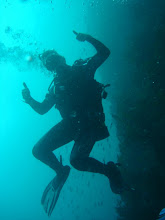Leaving icy England for mild Morocco was a very
welcome opportunity to thaw out, under clear, blue Marrakeshi skies. With the
snow capped majesty of the High Atlas Mountains as a backdrop, and the
haunting, atmospheric chorus of myriad muezzin calling the faithful to prayer
drifting across the rooftops, this colourful and chaotic city was an intriguing
place to explore.
Staying in the riads, traditional Moroccan houses,
was wonderful. The spectacularly ornate architecture and fine décor of the
rooms, alluded to mystical tales of the Arabian Nights or to the exotic courts
of Islamic royalty, and set around the pretty sun-drenched and charismatic
courtyards, to stay here was to reside in a silent, serene oasis in the midst
of the mayhem.
To step out into the labyrinthine souks within the
crumbling Medina walls was to become Theseus confronting a thousand Minotaurs, albeit
friendly ones. With your wits about you, bargains could be proffered, though
escaping the maelstrom of fez toting, cringily obeisant marketeers to the
sanctuary of the riad was not so easy. Amid the bazaars, each street mirrors
the next, with a thousand different sellers selling a million things the same,
each stall holder apparently ‘remembering’ you from yesterday…it was very easy
to get lost. Besides, a trail of breadcrumbs would certainly be snatched up by
the hordes of melancholic and hungry street kids. It was great fun in the
markets, a real haggler’s haven, but one thing troubled me. All my life I’ve
believed I only have one brother, yet in Marrakesh I met so many men vehemently
claiming kinship with passionate cries of, “My brother! My brother.” It really
has me wondering. Mum! Something you want to tell me?
There are many places and people in the world that
could learn a few things from Moroccans. In Marrakesh, Muslims, Jews and
Christians live, work and socialize together in natural harmony. There is not
at all a sense of toleration, but a genuine acceptance and appreciation of
different faiths, harmonious for centuries, while religions and some of their
followers continue to make large parts of the world unpleasant and dangerous.
To Marrakesh, if I wore a fez, I would tip it to you now. Instead, I will
simply say ‘tres bien, and merci.
A road trip beyond the city saw us nervously traversing
the frozen peaks of the High Atlas, via perilous, innumerous switchbacks,
before descending into the unfolding arid vastness of the northern Sahara.
Abandoned mud brick Berber villages clung to the surrounding, windswept
hillsides, while occasional, vibrant flashes of colour indicated rare and
sporadic life along the fringes of the modern highway. A couple of hours into
the barren terrain, the ancient citadel of Ait Ben Haddou rose before us. For
millennia it served as an important caravan stop on the old trade route from
Timbuktu to the Mediterranean, and though the weather-beaten landscape here
seemed familiar, as yet I knew not why.
I soon learned though that this
beautiful old city had been used as the setting for many a Hollywood movie
scene; Gladiator and Kingdom of Heaven to name but two. The innate character
and looming presence of the rustic, archaic structure, seemingly carved from
the very desert from which it rises, exuded romantic notions of a bygone era,
and to explore its silent, dusty alleyways as the setting desert sun cast its
long, creeping shadows all about, was to truly take a step back into history.
Back in bustling Marrakesh, with its constant though
not unpleasant cacophony of noises, from the incessant pipes of the snake
charmers and the clip clopping trundle of a thousand horse drawn carriages, to
the melodic muezzin and the plaintive cries of the street urchins for
baksheesh, you come to understand why the desert was virtually devoid of all
humanity: Everybody, it seemed, was in the magical medina of Marrakesh. We
didn’t realize it yet, but our glimpse of gladiators and Minotaurs in the
relatively composed mayhem of Morocco, would completely be surpassed the moment
we touched down in Egypt. For to step into Egypt, is to well and truly ‘Enter
the Arena.’








